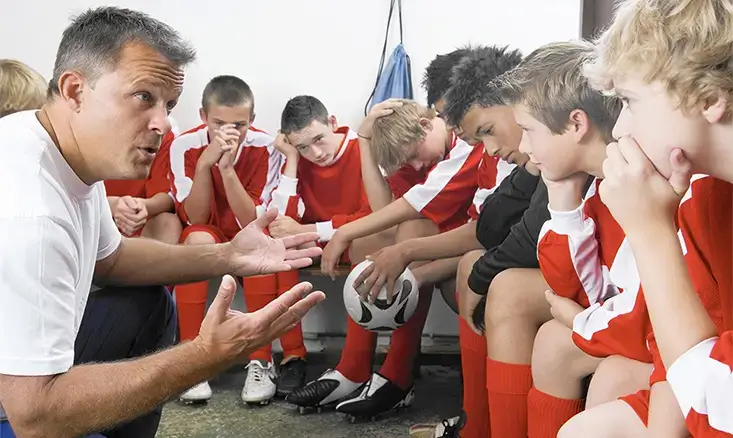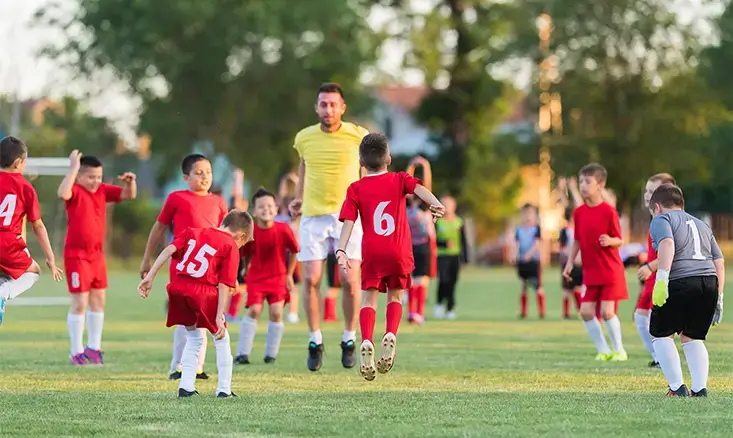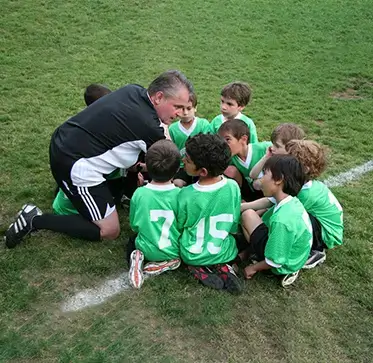CRFC BLOGS
LATEST BLOGS & NEWSLETTERS
The Art of Communication in Youth Soccer:
Mastering On-Field and Off-Field Interactions
Communication is one of the most vital soccer skills, yet it’s often overlooked in favor of physical and technical abilities. For young players, learning to communicate effectively on the field with peers and off the field with coaches is crucial to their development and success. This article explores the importance of communication in soccer and provides practical tips for young players to improve their on-field and off-field interactions.
The Importance of On-Field Communication
Communication can be the difference between a cohesive team and a disorganized one on the soccer field. Effective soccer communication helps players understand each other’s intentions, coordinate movements, and execute strategies. Here’s why it’s essential:
Building Team Cohesion
When players communicate, they build trust and understanding with their teammates. Simple phrases like “man on,” “turn,” or “switch” help keep everyone on the same page and make the team function as a unit.
Enhancing Decision-Making
Soccer on-field communication allows players to make quicker and better decisions. For example, if a defender shouts “back,” the player with the ball knows to pass back to reset the play rather than forcing a risky move.
Increasing Awareness
Communication keeps players aware of their surroundings. Shouts of “left shoulder” or “time” can inform players of an approaching opponent or how much time they have before pressure arrives, allowing them to act accordingly.
Tips for Effective Soccer On-Field Communication
Improving Soccer on-field communication takes practice and confidence. Here are some tips for young players:
Use Simple, Clear Language
Stick to basic soccer terms that everyone understands. Phrases like “mark up,” “drop,” or “man on” are universally recognized and can be quickly processed by your teammates.
Be Loud and Assertive
Don’t be afraid to raise your voice on the field. Clear, assertive player communication cuts through the noise and ensures that your message is heard by teammates.
Stay Positive
Keep your communication constructive and encouraging. Instead of saying, “Don’t lose the ball,” try “keep it simple.” Positive language builds confidence and fosters a supportive team environment.
Communicate Constantly
Communication shouldn’t only happen during key moments like set pieces or defensive transitions. Keep the dialogue going throughout the game, whether it’s giving instructions, offering encouragement, or simply letting teammates know you’re there to support them.
Lead by Example
If you want your teammates to communicate more, start by doing it yourself. Often, when one player begins to communicate effectively, it encourages others to do the same.
Improve your on-filed communication by practicing youth soccer communication drills.

The Role of Off-Field Communication with Coaches
While on-field communication is about working as a team, off-field communication with coaches is about personal growth and development. Many summer soccer camps include one-on-one sessions with coaches to help players build this skill. Good communication with your coach can open doors to new opportunities, provide valuable feedback, and help you understand your role within the team.
Tips for Effective Off-Field Communication with Coaches
Communicating with coaches can be intimidating for young players, but it’s a skill that can greatly enhance your development. Here’s how to do it effectively:
Be Respectful and Professional
Always approach your coach with respect. Use appropriate language, maintain eye contact, and listen carefully when they speak. This shows that you value their time and feedback.
Ask Questions
Don’t be afraid to ask your coach questions. Whether you’re unsure about your role on the team, need clarification on a drill, or want to know how to improve a specific skill, asking questions shows that you’re engaged and eager to learn.
Seek Feedback
Regularly ask your coach for feedback on your performance. This could be after a game, during a practice, or in a one-on-one meeting. Feedback is essential for growth, and by seeking it out, you demonstrate a commitment to improving.
Be Open to Criticism
Not all feedback will be positive, and that’s okay. Coaches are there to help you improve, and sometimes, that means pointing out areas where you need to do better. Accept constructive criticism with an open mind and use it as a learning opportunity.
Express Your Goals
If you have specific goals—like improving a particular skill, earning more playing time, or taking on a leadership role—communicate them to your coach. This helps them understand your ambitions and allows them to provide guidance on how to achieve them.
Communicate Challenges
If you’re struggling with something—be it a skill, confidence, or balancing soccer with other commitments—let your coach know. They can offer support, adjust expectations, or provide advice to help you manage the situation.

Bridging the Gap: Connecting On-Field and Off-Field Communication
The best soccer players are those who excel in both on-field and off-field communication. Here’s how you can bridge the gap between the two:
Use What You Learn Off the Field
If your coach gives you feedback during a one-on-one conversation, apply it on the field. For example, if they suggest you work on your positioning, make it a point to communicate with teammates during games to improve in that area.
Be a Communicative Leader
Use your soccer on-field communication skills to show your coach that you’re implementing their feedback. If you’ve discussed taking on a more vocal role, make sure your coach sees you directing and encouraging your teammates during practices and games.
Build a Relationship
The more you communicate with your coach off the field, the more comfortable and effective your on-field communication will become. When you have a solid understanding of your coach’s expectations, it’s easier to execute their game plan and lead your teammates.
Conclusion: The Key to Success
In soccer, communication is more than just talking—it’s about connecting with others to achieve a common goal. By mastering the art of communication on the field with your peers and off the field with your coaches, you’ll not only become a better player but also a more effective teammate and leader. Remember, soccer is a team sport, and effective communication is the glue that holds a team together. Whether it’s calling for the ball, encouraging a teammate, or seeking feedback from your coach, every interaction counts. Start practicing these communication skills today, and watch how they elevate your game.
Join our Upcoming Seasons and Camps to learn and practice youth soccer drills.

FAQs
How important is communication in soccer?
What are some effective on-field communication techniques for soccer players?
Soccer players can use simple, clear phrases like “man on” or “switch” to communicate on the field. Being loud, assertive, and consistent helps ensure teammates get the message.
How can soccer goalies improve their communication with defenders?
Soccer goalies should use strong, clear commands like “push up” or “mark” to direct defenders. Good communication helps organize the defense and prevent goals.
What are some soccer drills that teach effective communication to players?
Soccer drills like small-sided games or passing exercises with a focus on calling out for the ball can help players practice and improve their communication on the field.
How should soccer coaches communicate with their players to enhance performance?
Soccer coaches should give clear instructions, provide constructive feedback, and encourage open dialogue with players. This helps build trust and improves overall team performance.

Did you find this useful?


